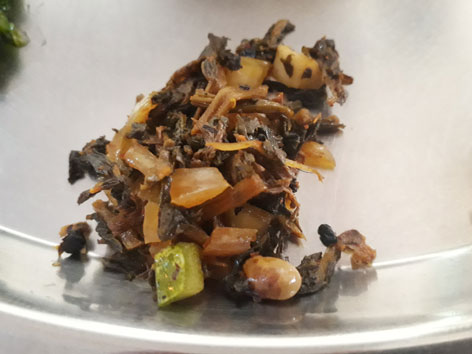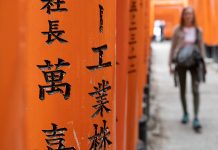Gundruk pickle accompanies many meals, including the omnipresent dal bhat, and it’s difficult for many non-Nepalis to guess what it is because it’s quite different from anything else. Gundruk is a fermented leafy green vegetable: saag, which is usually translated to spinach but actually refers to most leafy green vegetables in Nepali (not just what English speakers would call spinach). It’s made by placing the green vegetable in an earthen pot and burying it for a few days somewhere in the sun. It has a slightly mushroomy flavor and texture—earthy but slightly sour, thick and a bit fibrous. Although fermented, it doesn’t have the same pungence or extremely strong taste that many fermented foods around the world can have (such as natto in Japan, or hakarl in Iceland), so don’t be turned off by the fact that it’s fermented. Gundruk isn’t scary, but it is an acquired taste for some non-Nepalis … more akin to Korean kimchi.
Where: Patan Museum Café (Patan Durbar Square, Patan, 44600, map) is an inviting place to stop for a dal bhat lunch—accompanied by gundruk pickle—while out sightseeing in Patan.
When: Daily, 9am-4pm
Order: This gundruk pickle, though pictured separate, came with the dal bhat set, which is called the “traditional Nepali thali” on the menu here—veg costs Rs 475; non-veg Rs 650. It is very typical of what gundruk pickle is, its earthy flavor a great complement to the rice, lentils, spinach curry, crunchy papad, and spicy tomato pickle also in the platter.
Alternatively: You’ll most likely encounter gundruk pickle as part of a dal bhat meal; in Kathmandu, more often than not, it will be included there. For dal bhat, all items are dolloped onto one big plate, so if in doubt about which one is the gundruk, ask your server!
There has never been a better time to plan your next trip and make your Dream vacation a reality . Whether you've been dreaming of relaxing on a sun-kissed beach, exploring ancient cities, or embarking on an epic adventure, now is the perfect moment to make it happen.













